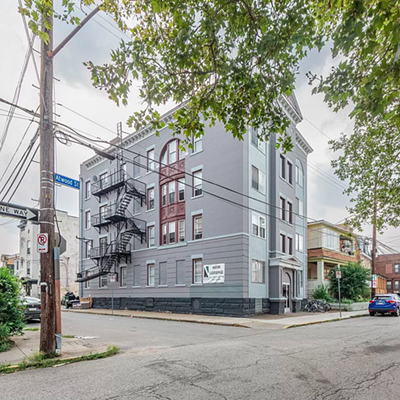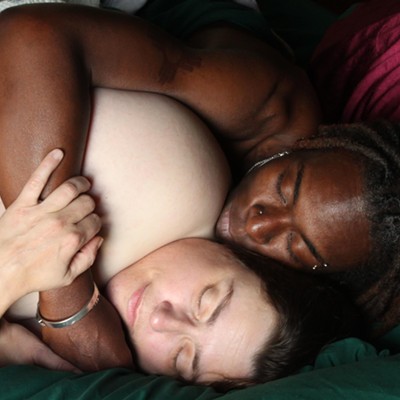That would have to be my boss, Andy Newman.
I know, I know. But I'm still holding out hope for a holiday bonus. Plus, the guy owes me $10, so if I put in a good word with his boss, I stand a better chance of seeing that money back some day.
Anyway, naming the greatest writer is obviously utterly subjective. So is choosing which writers are Pittsburghers: Do you count those that were born here but found their fame elsewhere? People born elsewhere who found fame here? I'll say it up front: What follows is nothing more than an arbitrary selection of some names you'd have to rank among the region's best writers. So don't yell at me if I skipped your favorite writer, especially because by the time I get your letter, I'll be hung over.
The first thing you notice about Pittsburgh writers is that they tend to be drawn from the ranks of the city's most ignored or exploited populations: African Americans and women. I mean, when you think of the phrase "Pittsburgh writer" the first thing you think of -- after "Dear God why?" -- is most likely playwright August Wilson. The guy's won two Pulitzers, for Fences and The Piano Lesson, based on recollections of his early life in the Hill District, where he was born (as Frederick August Kittel) in 1945.
Often mentioned just behind Wilson is John Edgar Wideman, author of Brothers and Keepers (about his own brother, in jail as an accessory to murder) and Hoop Roots. Wideman, too, has left town: Apparently, Pittsburgh is a nice place to write about, but you wouldn't want to live here. (Wilson even moved to Seattle -- just like a young tech worker.) Albert French, the third member of Pittsburgh's black literary troika, is still around though he doesn't sound too happy about it.
Pittsburgh women have also done well as writers. Gertrude Stein was born in the city's North Side, and then lit out for Paris, where she wrote books like Tender Buttons, which is much less titillating than the title suggests. Rachel Carson, of course, is the Springdale native whose book Silent Spring did as much as any other book to establish the modern environmental movement. Annie Dillard is a naturalist and essayist of no small repute as well. But probably the best-known novelist is Willa Cather, who lived in Pittsburgh for a decade and is probably best remembered -- at least by anyone who's ever been a recalcitrant high school English student -- for My Antonia and O Pioneers. One of her more famous short stories, "Paul's Case," was based on the real-life suicide of a Pittsburgh boy. In Cather's hands, the tale becomes a story about suppressed sexuality and a yearning for culture in a city with little appetite for it.
In fact, you don't really see a lot of white men like Cather's Paul numbered among the great Pittsburgh writers. I guess we're too busy running everything for ourselves and keeping the rest of you down. Maybe so many of our best writers are blacks and women because we've given them few other venues in which those groups can succeed.
At any rate, as a white male myself I'll also name one of my own favorites: a dead white male (of course!) named Edward Abbey who grew up well outside of Pittsburgh in Home, Pennsylvania -- where the closest thing to a big city was Kittanning. Abbey lived and wrote out in the American desert, but he certainly has much in common with this region. Like Rachel Carson he was an environmentalist, and from what I gather he liked women almost as much as Gertrude Stein.
Abbey is probably best known for his book of essays, Desert Solitaire -- writings that are by turn lyrical and muscular, angered and impassioned. But his other legacy is a radical environmentalism that has, for better or worse, inspired a generation of Earth First! militant activism: The title of one of his novels, The Monkey Wrench Gang, lends its name to the practice of "monkey-wrenching" -- sabotaging loggers and other industries to protect the environment.
Abbey isn't a great writer in the sense that Cather and Wilson are. But he is in many ways a quintessential Pittsburgh jagoff: a guy who loves the environment but confesses that nature is "a great place to throw the beer cans"; a noted womanizer who nonetheless argued that anything less than abortion-on-demand was tantamount to "compulsive maternity"; a gun-rights absolutist who decried the Vietnam War.
And hardly a week goes by that I don't see an insight of Abbey's confirmed. When the Brookings Institution recently reported that suburban sprawl was a larger problem in Pennsylvania than almost any other place in the country, I was reminded of Abbey's critique that "perpetual growth is the creed of the cancer cell." He also once warned that when any city's biggest and glassiest buildings belong to banks, that town is in trouble. It's too bad the white males running Pittsburgh -- a city where banks are some of the largest employers but pay no business tax into its empty coffers -- haven't read him already.










